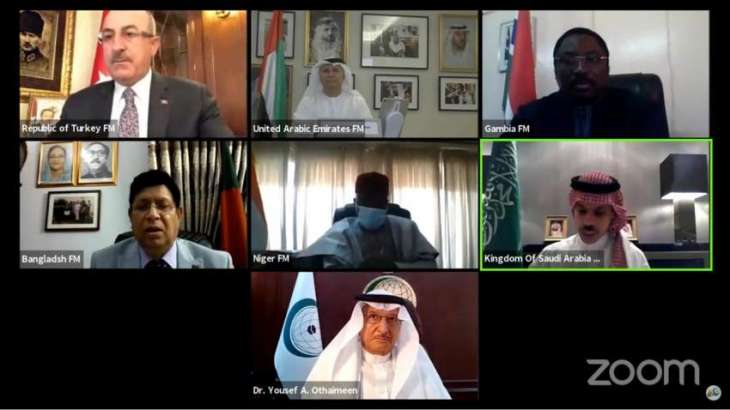On 22 April 2020, the Executive Committee of the Organization of Islamic Cooperation (OIC) held an extraordinary foreign ministerial meeting, conducted via teleconference, to discuss the implications of the novel coronavirus (COVID-19) on the health sector and financial stability in the OIC member states
Jeddah (Pakistan Point News - 23rd Apr, 2020) On 22 April 2020, the Executive Committee of the Organization of Islamic Cooperation (OIC) held an extraordinary foreign ministerial meeting, conducted via teleconference, to discuss the implications of the novel coronavirus (COVID-19) on the health sector and financial stability in the OIC member states.
The meeting was presided over by His Highness Prince Faisal bin Farhan Al Saud, the Foreign Minister of the Kingdom of Saudi Arabia, the Chair of the 14th Islamic Summit, with the participation of the Secretary General of the Organization of Islamic Cooperation (OIC), Dr Yousef Al-Othaimeen.
Opening the meeting, the Saudi Foreign Minister gave a brief account of his country’s support to the world in response to the pandemic. He pointed out that the Kingdom donated $500 million in financial support to relevant international organizations, in addition to $10M to the World Health Organization (WHO), $38M in health aid to Yemen, and $3,010,000 to the State of Palestine. He added that, Saudi Arabia donated $9M to the Islamic Solidarity Fund (divided in three equal parts over three years).
For his part, the OIC Secretary General said the whole world is in the same boat in the fight against COVID-19; a pandemic with far-reaching implications on a national, regional and global scale. The situation is such, he stressed, that it requires more than ever today of the member states to join forces, enhance their Islamic-driven solidarity, cooperation and coordination to stem the spread of the virus.
The foreign ministers, members of the Executive Committee, all stressed the need to tackle the virus and its implications for health, humanitarian, social and economic systems.
As well as calling for global COVID-19 response efforts to continue in a spirit of solidarity, drawing on scientific research and large-scale coordination, they underlined the importance to scale up national preparedness and response measures of prevention and alleviation of the devastating effects of the pandemic.
Further, the ministers commended the member states for the COVID-19 pre-emptive, timely precautionary measures taken, paying tributeand expressing their support to frontline health workers and all those who deliver basic and life-saving services to coronavirus-hit people in these trying times.
The foreign ministers also placed on record their appreciation for the efforts deployed by the OIC to reach out to the wider Muslim public with information on the member states’ response plans and through sensitization and enlightenment on the seriousness of the virus. They also commended the IsDB (Islamic Development Bank) emergency response initiative of allocating funds for the member states to contain the negative effects of the virus. Also lauded was the joint OIC-ISF initiative of setting up an account for the member states, especially least developed ones, to strengthen their response to the novel coronavirus. The participants also hailed as positive the outcome of the OIC Steering Health Committee’s meeting and the symposium held earlier by the International Islamic Fiqh Academy on the coronavirus outbreak.




